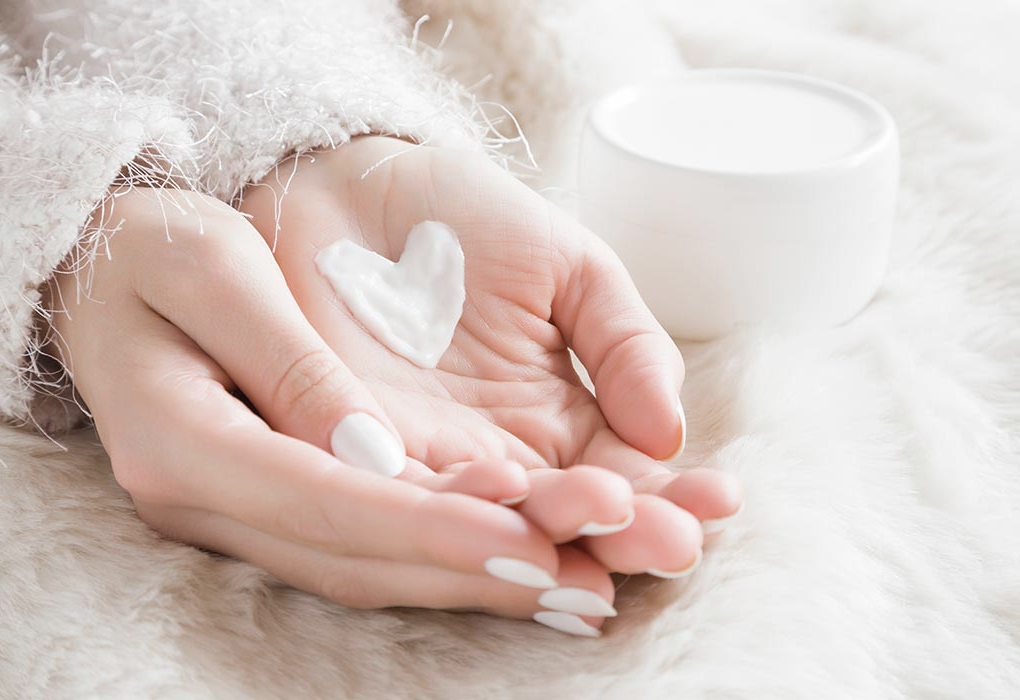Top 10 Tips for Healthy Winter Skin

Your skin may suffer greatly in the winter, and it may seem hopeless: Your skin becomes red and raw in the harsh, cold weather outside, while the heat indoors depletes both the air and your skin of moisture.
The American Academy of Dermatology (AAD) points out that sitting by a blazing fire is one of the many lovely things about winter, but it can also dry up your skin. Furthermore, according to the University of Tennessee Medical Center, hot water depletes skin of its natural oils even if a hot shower can make you feel warmer.
Read More: 10 Tips for Healthy Winter Skin
Fortunately, there are plenty of strategies to address the root causes of dry skin and maintain your moisture and suppleness throughout the season, including small adjustments to your daily regimen.
Read on for 10 simple, dermatologist-approved tips for glowing healthy winter skin.
1. Invest in a Humidifier to Maximize Moisture
“The outside air is usually drier, colder, and holds onto less water during the cooler winter months,” says dermatologist Naissan O. Wesley, MD of Skin Care and Laser Physicians of Beverly Hills in California. According to the Cleveland Clinic, a humidifier in your house or place of business will replenish the moisture in the air, keeping your skin hydrated.
Keep the humidity levels in your house between 30 and 50 percent by running a humidifier in every room or in the ones you spend the most time in. Leaving it on while you sleep is one way to use it. You can buy a humidity meter, like the well-reviewed Goabroa unit, if you’re not sure how humid your house is.
2. Keep Thermostat Temperatures Cool and Comfortable
It could be tempting to turn on the heat as soon as you get home if you’re trying to escape the dry, frigid outside air. But according to the American Osteopathic College of Dermatology (AOCD), having a high central heat unit can actually make the air in your home more drier. To stop your skin from drying out even more, use a chilly but comfortable setting (the AOCD suggests 68 to 75 degrees F).
3. Lower Water Temperatures for Showering and Hand-Washing
When it’s chilly and windy outside, long, steamy showers might seem like a fantastic idea, but too hot water can dry up the skin, according to dermatologist Marie Hayag, MD, who founded Fifth Avenue Aesthetics in New York City. According to the AAD, a warm shower or bath lasting five to ten minutes is less likely to exacerbate dry skin than a hot one.

Moreover, you should refrain from washing your hands in too hot water. This is particularly true if you frequently have red, scaly, and itchy hands—all of which the National Eczema Association lists as possible symptoms of eczema. Breakouts from eczema can be brought on by dry skin from exposure to hot shower or cold winter air.
4. Opt for Gentle, Fragrance-Free Body Cleansers
According to Dr. Wesley, using bar soap while taking a bath might exacerbate dryness by removing the skin’s natural oils and upsetting the microbiome.
Dr. Hayag advises using body wash for people with dry skin. “Search for shampoos with the labels ‘fragrance-free, dye-free, or for sensitive skin.'” They frequently include more moisturizing components like hyaluronic acid, ceramides, oils, shea butter, and oats and less drying ones like ceramides.
The AAD suggests looking for items that are labeled “fragrance-free.” Products labeled as “unscented” may in fact have chemicals that mute aroma and irritate skin.
5. Modify Your Skin-Care Regimen for the Season
Hayag advises reducing the use of skin care products on your face that contain retinoids and alpha-hydroxy acids (AHAs) if your skin is dry and itchy. These products can exacerbate the problem and even indicate that you have an irritant dermatitis, which is a skin reaction brought on by prolonged exposure to an irritating substance. “You can gradually resume the retinoid and alpha-hydroxy acids once the skin heals,” the expert advises.
The AAD advises avoiding alcohol-based and fragrance-containing products in addition to avoiding AHAs and retinoids when your face is feeling dry. This will assist your skin preserve its natural oils.
For your skin-care regimen, opt for oils and creams instead, and if your toner is making your skin feel dry, think about using a moisturizer on top of it, advises Wesley.
Apply a more intense moisturizer to your arms, legs, and belly at night. Hayag advises, “Look for occlusives, such as petrolatum, squalene, and shea butter.” “These ingredients create a protective layer over the skin to seal in moisture.” Hayag also suggests looking for a lotion that has humectants that moisturize, such glycerin and hyaluronic acid. These are excellent face ingredients because they let the skin breathe and aren’t prone to aggravate acne.
Additionally, remember to moisturize the remaining portion of your body. Wesley advises applying a heavier cream that comes out of a jar or tube rather than a pump for the body during the winter. “Lotions that come out of a pump tend to be thinner and more watery, which means that they are not thick and moisturizing enough and can often just evaporate from the skin’s surface after application.”
6. Moisturize Hands Frequently, Especially After Washing
As the CDC points out, hand washing is essential, particularly when COVID-19, the flu, and the common cold are on the rise. But according to Linda Stein Gold, MD, a board-certified dermatologist at Henry Ford Medical Center in West Bloomfield, Michigan, “constant washing will cause the hands to take a beating.”
After washing your hands, Dr. Stein Gold suggests using hand cream. Additionally, she advises putting on waterproof gloves to save your hands when doing household chores including dishwashing.
You can put on cotton gloves after applying moisturizer to help your skin absorb the cream, says Wesley.
7. Apply Sunscreen Even on Gray Winter Days
According to the Skin Cancer Foundation, snow reflects the sun’s rays on bright winter days, increasing your UV exposure. According to the American Cancer Society, UV radiation are associated with skin cancer, sunburns, and premature skin aging (leaky skin, wrinkles, and liver spots).
This implies that wearing sunscreen in the chilly winter months is just as crucial as it is in the warmer months, regardless of whether you’re playing in the snow, heading down the slopes, or running errands through a parking lot.
Winter’s darker, gloomier days shouldn’t deceive you either. According to the Skin Cancer Foundation, up to 80% of the sun’s dangerous UV radiation can penetrate clouds and still do harm.
The Skin Cancer Foundation advises applying a broad-spectrum sunscreen with an SPF of 30 or higher, water resistance, and moisturizing compounds like glycerin or lanolin to all exposed body parts before going outside.
8. Wear Appropriate, Comfortable, Nonirritating Clothing
A lot of winter-dry textiles can exacerbate dry skin. “Avoid letting wool and rough clothing come into direct contact with your skin,” advises Stein Gold. “This may lead to irritation and itching on dry skin.”
Rather, wear airy layers next to your skin that are composed of supple, breathable materials (like silk or cotton). The AAD advises putting on your bulkier, warmer sweaters after that.
Be sure to protect your hands from cold winter air with gloves or mittens. If wool gloves are too irritating, try leather ones, Wesley suggests.
9. Remember to Eat Right and Stay Hydrated
It could be feasible to moisturize your skin a little bit from the inside out, but don’t expect dramatic benefits. According to Wesley, “one of the best things you can do via diet to avoid dryness is to stay hydrated by drinking plenty of fluids, like water.” According to a tiny study, individuals who typically drink little water can improve their skin’s hydration levels by increasing their intake—in this example, by two liters over their daily average.
Your food intake might also be a factor. “The body and skin will remain healthy by avoiding processed foods and sugars and by eating whole foods that are rich in important vitamins, minerals, and fatty acids,” advises Wesley.
10. Pat Yourself Dry, Then Lock in Moisture
After washing your hands, pat them dry, advises Hayag. According to the AOCD, blotting or patting dry skin helps it retain more moisture than rubbing it.
In order to seal the water in your skin, Stein Gold suggests doing the same thing when you towel off after a shower: “Blot skin dry and apply a thick moisturizer within a few minutes after bathing.”
A Final Word on Healthy Winter Skin
If these healthy skin tips don’t alleviate your dryness, pain, redness, and irritation, Stein Gold advises using an over-the-counter 1 percent hydrocortisone lotion. “Speak with your doctor if you don’t see improvement in a few days,” advises Stein Gold. According to the American Academy of Dermatology, dry skin during the winter may indicate a skin issue that needs to be treated, or you may need to use a prescription-strength moisturizer to counteract the drying effects of the cold weather.












One Comment